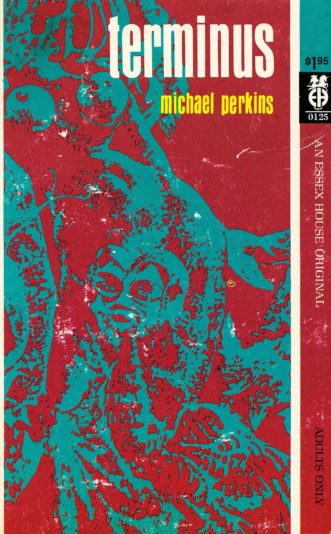 By MICHAEL PERKINS (Essex House; 1969)
By MICHAEL PERKINS (Essex House; 1969)
Another long out of print entry in the late-1960s Essex House line of erotic fiction, written by one of its most prolific contributors. TERMINUS is noteworthy as the only one of Michael Perkins’ Essex House novels to utilize the nightmare future sex trope of so many of Essex’s other publications. Examples include David Meltzer’s BRAIN PLANT tetralogy, in which sex was used as a controlling agent by a fascistic government, as well as RAW MEAT by Richard E. Geis, in which physical intimacy was outlawed in favor of virtual reality simulations, whereas here sex is but a respite from a profoundly unpleasant reality.
In this respect the sexual content of TERMINUS feels a bit gratuitous, seeing as how, unlike Perkins’ other Essex novels (such as EVIL COMPANIONS and QUEEN OF HEAT), it isn’t integral to the story. In fact, the driving force in TERMINUS’ future world is violence and its unholy allure, which places the novel in the company of J.G. Ballard.
In Perkins’s future New York City, a thinly-veiled extrapolation of the bleak realities of the late 1960s, rampant violence and race riots are constants. Utilizing an idea common to many science fiction novels and films, Perkins has the rich white people of this society living in a hermetic enclosure known as the Complex. Existence in the Complex, as the novel’s bored protagonist Zetterling well knows, is tightly regulated by unseen overseers, with a hallucinogenic drug called Happiness being all that makes life bearable. The surrounding “Tenement towns,” populated largely by non-white folk, are off-limits to residents of the Complex, yet Zetterling finds himself inexorably drawn there.
During his first venture outside the Complex Zetterling is raped and stabbed. This only increases his wanderlust, and he purchases a Bowie knife (which is apparently “like buying as extra penis to wear on his hip”) that proves to be quite advantageous in the Tenement towns. Here Zetterling takes up with a fellow Caucasian outcast who happens to be a sexually compatible woman, and the two find shelter in a hippie commune called Oz. But the forces of chaos and disorder are still very much in evidence, as proven by the horrific orgy of rape and brutality that climaxes the novel.
It all adds up to a fairly powerful account of urban strife, rendered in Michael Perkins’s usual gritty yet enigmatic, poetry-inflected style (resulting in sentences like “he wanted to fuck death, who had gotten into bed before him”). Also, as with Perkins’s other Essex House publications, TERMINUS is very much a product of its time, from its idyllic portrait of communal life to its downright ferocious portrayal of race relations, which by today’s standards seem a mite politically incorrect.
